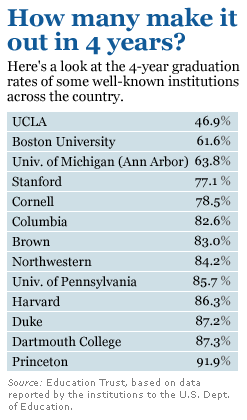NEW YORK (CNN/Money) – You send your children off for four years of college and they come back with five or six. This may be one instance where more isn't always better.
A report published recently by the Education Trust, an independent nonprofit organization, found that only 37 percent of first-time freshmen entering four-year bachelor's-degree programs actually complete their degrees within four years.
Another 26 percent take either five or six years. And the remaining 37 percent either don't get their degrees at all or complete their coursework in more than six years.
"It's atypical to get a degree in four years," said Kevin Carey, author of the Education Trust's report, "A Matter of Degrees: Improving Graduation Rates in Four-Year Colleges and Universities."
Blowin' it like Bluto?
You may think a student who can't wrap it up in four years is spending a little too much time living la vida Bluto, John Belushi's character in "Animal House." (After learning of his expulsion, Bluto invokes the name of Jesus Christ and says, "Seven years of college down the drain.")
But the truth is, there are a host of reasons a college student may be on the extended plan.
A lack of adequate funds or a family crisis may keep a student away for a semester or more. (The six-year graduation rate of low-income students is 54 percent compared with 77 percent for high-income students, the Education Trust found.)
Switching majors or taking a double major may add to the time spent on campus, as can transferring schools.

Working during college also can delay the process of getting out as can postponing required courses for one's major because a class is oversubscribed.
Then there's the issue of schools that don't necessarily make an effort to keep students on track. A school may not do much, say, if a student is failing to make progress toward completing his major, Carey said.
Or, if a student has been flunking courses, a school may impose a probationary period, but never actually kick the student out. So if the student continues to take courses but doesn't thrive academically, that can turn into "the academic equivalent of the money pit," said James A. Boyle, president of College Parents of America, an advocate for parents of college students.
Econ 101: Payin' for it anyway
Even if a student is doing well academically, there's a cost to prolonging the bachelor's journey.
| RELATED ARTICLES
|

|
|
|
|
Some schools will charge you per term, rather than per credit. So whether you're taking a full load or a light one, you still pay full fare. And for every semester you stay beyond four years, the money out of your pocket (or the increase in your loan balance) can be considerable.
If you're only paying by tuition credit, it won't be quite as onerous. But you can be sure those credits will cost you more in the fifth and sixth years than they would have in any of the first four, given that annual college tuition increases have outpaced inflation for the past 20 years.
And for students who rely on Pell Grants to help foot the bill, they may find themselves in a pickle if they try to play catch-up to graduate in four years by taking summer courses. That's because Pell grants are only given for study during the traditional academic year, Boyle said.
But the cost is greatest for those who never graduate. Forget the fact that you'll never get a refund for the credits you did take or that the debt you incurred won't be forgiven. The hit to your lifetime earnings is dramatic.
"Half of the credits you need for a degree don't get you half of what a college degree gets you in the job market. ... It gets you very little," Carey said.
What you can do
Parents often put a lot of energy into getting their kids into school and assume once that's done the rest will take care of itself. But, Boyle advises, "as much focus should be spent on succeeding in school as on getting in."
Once enrolled, if your children aren't prepared academically, they may have to take remedial courses to catch up and that can delay their graduation.
Four-year graduation rates vary widely from school to school, even among peer institutions, so it might be worth noting the graduation rates when looking for colleges.
Not surprisingly, some of the premier schools in the country boast some of the best graduation rates nationwide, but even they have their differences.
Based on data of full-time degree-seeking freshmen who enrolled for the first time in the fall of 1996, Princeton graduated 92 percent of them within four years, Harvard graduated 86 percent and Cornell graduated 79 percent.
(For more on how to make sure your hard-earned college savings are put to good use, click here.)

|

